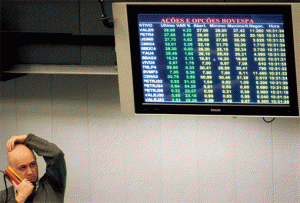From the Think Tanks
Recent studies from around the hemisphere offer some intriguing new takes on current issues. The Center for the Opening and Development of Latin America (CADAL)—a Buenos Aires-based research institution founded in 2003—compiles the annual indices that have become all the rage, with institutions now measuring democratic liberty, corruption, development of market economies, and government transparency. … Read more
Film: Entertainment for the Masses
Every peso counts these days, so it’s good to find cheap fun. In Mexico City, a Friday night at the movies—popcorn not included—costs about $3, just slightly below the country’s $3.40 average daily wage. Enter Ariel Zylbersztejn, 28-year-old founder of CinePOP, an initiative that brings popular cinema to Mexico’s underprivileged—free of charge. At least twice … Read more
10 Things to Do: Santiago, Dominican Republic
1. Play Ball. More than a sport, baseball is a way of life. From October to January, Santiagueros rush to El Estadio Cibao to support the hometown Águilas Cibaeñas, winners of 20 Dominican titles. 2. Enjoy a Puro. Learn about the art of cigar-making—from the cutting of the tobacco leaf to the rolling of the … Read more
Latin Culture 2.0
Looking for YouTube clips of the latest hot salsa band? Want to find the best Panamanian restaurant in New York, San Francisco, Los Angeles, Chicago, or Miami? Fans of Latin culture in the U.S. now have a handy online information source. Remezcla.com is a unique cultural calendar listing Latin-oriented events in each of those cities, … Read more
Colombia’s New Beat
He launched his career re-interpreting the vallenatos of the master Rafael Escalona. Now Carlos Vives is going farther back in time to resurrect an icon of Colombian children’s literature, Rafael Pombo (1833 to 1912). Vives hopes to recover the values and ethics conveyed in Pombo’s whimsical fables of animals and the lessons of youth. In … Read more
[i]AQ[/i] talks to Jamaica’s Carolyn Gomes, winner of the 2008 UN Human Rights Prize.
Jamaican activist Carolyn Gomes received the human rights award for her crusade against extra-judicial killings. Gomes, a former pediatrician who founded Jamaicans for Justice a decade ago, talks to Americas Quarterly about why her country has one of the world’s highest rates of gang murders and police-related assassinations. Americas Quarterly: How will the United Nations … Read more
Obama’s Enforcement: What Now for Immigration?
Last December, the Department of Homeland Security (DHS) published an end-of-the-year fact sheet in which it listed its successes under then-President George W. Bush in advancing a number of strategic goals, the first of which was entitled “Protecting Our Nation from Dangerous People.” The first achievement cited under this rubric was that it had “turned … Read more
Trade: In the Midst of an Economic Crisis [i](Full Text)[/i]
Sharp contraction in the U.S. economy has hit Latin America where it hurts the most: in shrinking trade volumes. The so-called “vacuum cleaner effect,” or, the drying up of liquidity resulting from the collapse in U.S. credit markets, combined with decreased aggregate demand, has affected even the best-managed economies. The result is no surprise: falling … Read more
Term Limits can Check Corruption and Promote Political Accountability
Since the mid-1990s, no fewer than 10 countries of Latin America have attempted to reform, rewrite or reinterpret their constitutions. The chief motivation has been to extend the mandate of a popular chief executive. For the most part, public debate has concentrated on extending, but not eliminating, presidential term limits. Yet as stunted and unequal … Read more
Limit the Power of Presidents, Not their Term in Office
Let them run. The problem is not presidential re-election. The problem is presidentialism. As long as Latin American democracies continue to be based on institutional arrangements—both formal and informal—that concentrate power in the executive, democratic development will be undermined. This concentration of power carries the seeds of instability that will hinder, if not reverse, democratic … Read more
Do’s and Don’ts for Policymakers In the Midst of an Economic Crisis
1.) Seize the moment Systemic crises are moments of dislocation and uncertainty. But they also have a strong transformational dimension. Unusual circumstances tend to create rare opportunities. When there is a recognition that more of the same will not do, alternative ideas and possibilities emerge as workable options. A system in crisis either regresses and … Read more

Spain’s Efforts to Nudge Immigrants Home
By 8:00 a.m., the queue of people waiting to collect unemployment checks one recent morning at the downtown Madrid office of INEM (the National Employment Institute) was already long. That’s not a surprise: Spain’s 16 percent unemployment rate in (February) was the highest in Europe—a grim sign that the once-buoyant Spanish economy is now history. … Read more

Here We Go Again
This time it was supposed to be different. Even as the world economy spiraled into a free fall, Latin America seemed not only poised to break the boom-bust cycle of the previous three decades—but to survive the debacle of 2008. With the economic expansion that started in 2003, the region looked stronger than it had … Read more
Nuclear: Latin American Revival ([i]Full Text[/i])
Nuclear power, long on the outs, is fashionable again—this time as an antidote to energy insecurity and global climate change. In Latin America, the current plans for nuclear expansion are ambitious. Argentina and Brazil may seek to double or triple existing nuclear capacity. Mexico may build as many as eight more reactors by 2025. Chile, … Read more
NO: Leaders Should Resist the Temptation to Meddle
Shielding countries from the free flow of capital and financial innovation will dampen economic and social development. Among other things, regulation tends to diminish the liquidity of local markets. For example, the comparatively less regulated equity markets in Mexico average a daily trading volume of around $500 million, compared to only $20 million in Argentina, … Read more

